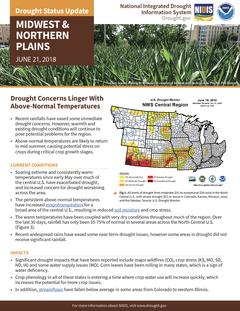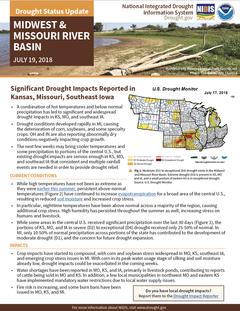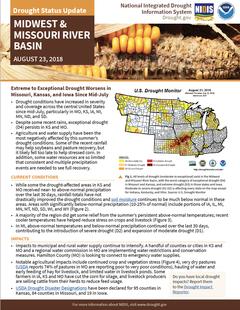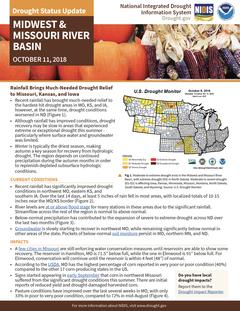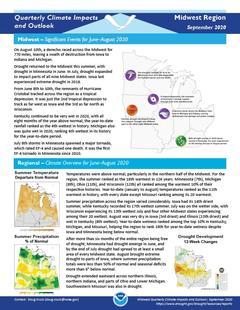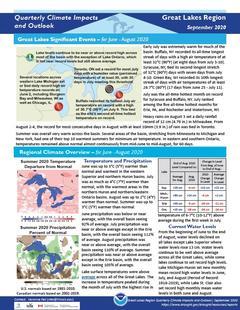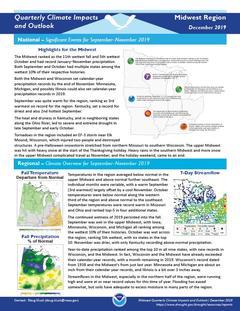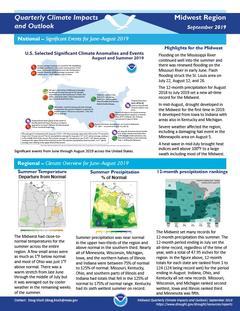For the latest forecasts and critical weather information, visit weather.gov.
A two-page status update on drought conditions, including current conditions, impacts, and outlook, in the Midwest and Northern Plains regions for June 21, 2018.
Significant Drought Impacts Reported in Kansas, Missouri, Southeast Iowa
Extreme to Exceptional Drought Worsens in Missouri, Kansas, and Iowa Since Mid-July
- Drought conditions have increased in severity and coverage across the central United States since mid-July, particularly in MO, KS, IA, MI, MN, ND, and SD.
- Despite some recent rains, exceptional drought(D4) persists in KS and MO.
- Agriculture and water supply have been the most negatively affected by this summer’s drought conditions. Some of the recent rainfall may help soybeans and pasture recovery, but it likely fell too late to help stressed corn.
Rainfall Brings Much-Needed Drought Relief to Missouri, Kansas, and Iowa
- Recent rainfall has brought much-needed relief to the hardest-hit drought areas in MO, KS, and IA, however, at the same time, drought conditions worsened in ND.
- Although rainfall has improved conditions, drought recovery may be slow in areas that experienced extreme or exceptional drought this summer - particularly where surface water and groundwater was limited.
- Winter is typically the driest season, making autumn a key season for recovery from hydrologic drought.
uarterly Climate Impacts and Outlook for the Midwest Region for June – August 2020. Dated September 2020.
Temperatures were above normal, particularly in the northern half of the Midwest. For the region, the summer ranked as the 18th warmest in 126 years. Summer precipitation across the region varied considerably. Iowa had its 14th driest summer, while Kentucky recorded its 17th wettest summer.
Quarterly Climate Impacts and Outlook for the Great Lakes Region for June – August 2020. Dated September 2020.
Summer was overall very warm across the basin. Several areas of the basin, stretching from Minnesota to Michigan and New York, had one of their top 10 warmest summers for minimum air temperature. In eastern and southern Ontario, temperatures remained above normal almost continuously from mid-June to mid-August. Summer precipitation was near or above average except in the Erie basin, with the overall basin seeing 105% of average.
Quarterly Climate Impacts and Outlook for the Great Lakes Region for December 2019 – February 2020. Dated March 2020.
Most of the Great Lakes states had one of their top 10 warmest winters on record. Winter was drier with the basin seeing 84% of average. There was below average ice cover due to warm air temperatures and lack of consecutive days below freezing.
Quarterly Climate Impacts and Outlook for the Midwest Region for September – November 2019. Dated December 2019.
Temperatures in the region averaged below normal in the upper Midwest and above normal further southeast. The continued wetness of 2019 persisted into the fall. Year-to-date precipitation ranked among the top 10 in all nine states, with new records in Wisconsin, and the Midwest.
Quarterly Climate Impacts and Outlook for the Great Lakes Region for September – November 2019. Dated December 2019.
Autumn temperatures ranged from 2°C (4°F) below normal to 2°C (4°F) above normal. Autumn precipitation ranged from 88% to 125% of average, with the overall basin seeing 115% of average.
Quarterly Climate Impacts and Outlook for the Midwest Region for June – August 2019. Dated September 2019.
The Midwest had close-to-normal temperatures for the summer across the entire region. Summer precipitation was near normal in the upper two-thirds of the region and above normal in the southern third.


